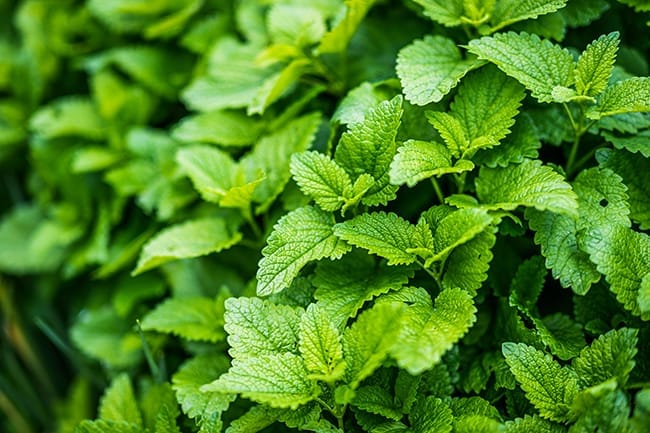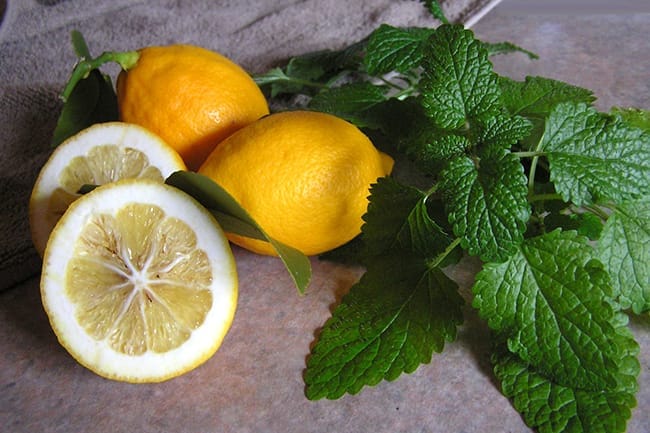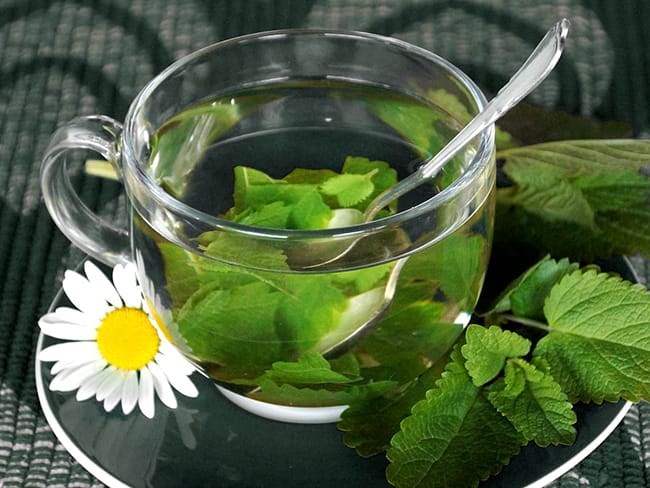Last Updated on 08/20/2023 by Desmond
Lemon balm is a popular choice for enhancing the beauty of gardens. During the summer, it releases a delightful lemony aroma, attracting adorable little bees and bringing the garden to life. People also enjoy gathering its leaves to make lemon balm tea, a delicious herbal infusion known for its many health benefits, especially in promoting tranquility of the mind. In European folk medicine, the popularity of lemon balm tea has endured for centuries.

CONTENT
What Is Lemon Balm
Although they contain the word “lemon” in their name, lemon balm and lemon verbena are two different plants. Lemon balm, also known as Melissa officinalis, is a perennial herb belonging to the mint family. The word “Melissa” means “bee” in Latin because its white or pale pink flowers attract numerous bees during the summer. “Balm” is a shortened form of “Balsam,” referring to the honey-like sweetness of its scent.
Lemon balm is native to Europe but is now cultivated worldwide. Its lush green leaves release a lemony fragrance, making it a popular garden ornamental plant. In the 19th century, during the medieval period, the first Holy Roman Emperor, Charlemagne, was so captivated by the benefits and beauty of lemon balm that he issued a decree ordering all monasteries within his domain to grow lemon balm. This marked the beginning of the widespread cultivation of lemon balm in Europe and also introduced it to the realm of medicine, as monasteries were among the first hospitals of the medieval era.
For centuries, lemon balm tea has been used as a natural sedative to anti-anxiety and improve sleep. It is often combined with other herbs to enhance its effects and improve the flavor of the infusion.

How Does Lemon Balm Tea Taste
Lemon balm belongs to the mint family, but it does not possess the peppery and cool notes of mint; instead, it offers a refreshing aroma similar to lemon.
Whether brewed as a cold infusion or a hot tea, the lemon-like fragrance is distinct, full of freshness and vitality, as if you were strolling through a lemon grove, bringing tranquility, joy, and relaxation.
Upon taking a sip, you’ll notice that lemon balm also carries a natural sweetness similar to lemons, accompanied by a subtle herbal essence. It carries a hint of sourness as well, but just an acceptable amount, not enough to frown your forehead tight like real lemons might do.

What Is Lemon Balm Tea Good For
Lemon balm has long been a prominent herb in the folk remedies of Western Asia and Europe. Its medicinal creams and essential oils are known for their healing properties in treating wounds, preventing infections, and soothing various skin conditions. Additionally, lemon balm tea provides many other health benefits besides its delightful taste and mind-peaceful effect. It has even shown promising potential in fighting cancer.
Calms Anxiety
Lemon balm tea has gained renown for its ability to alleviate depression and calm anxiety. Its efficacy has been embraced by various folk remedies across European regions and recorded in numerous herbal and botanical texts. A prominent example is “The Herball or Generall Historie of Plantes,” authored by John Gerard in 1597, a highly influential herbal compendium from the Renaissance era.
In a study in 2014, researchers explored these properties by creating a lemon balm extract, akin to iced tea. Lemon balm tea exhibited promising effects in countering anxiety and relieving stress during the experiment. The pity is that the exact mechanisms responsible for these effects have yet to be entirely made clean by the researchers.
Help With Sleep
Depression and anxiety are often accompanied by insomnia. Numerous studies have shown that lemon balm has sleep-enhancing properties, especially for women experiencing menopause. If you wish to improve the quality of your sleep with lemon balm tea, I suggest best to consume it two hours before bedtime; excessive water intake just before sleeping might have the opposite effect.
Help With Digestive
In traditional medicine, lemon balm infusion is utilized to ease digestive problems and support gastrointestinal health. It facilitates bowel motility, providing relief from issues like abdominal pain, bloating, and constipation that can occur after meals. Modern medical research conducted on mice has yielded similar findings, likely attributed to the antioxidant properties and calming effects of lemon balm.
Antioxidant
Many natural plant-based beverages provide remarkable antioxidant properties, and so does lemon balm tea. It is abundant in hydroxycinnamic acids, flavonoids, and phenolic compounds such as rosmarinic acid and caffeic acid, which aid in neutralizing free radicals and protecting the body from oxidative damage. Specifically, it’s particularly beneficial for conditions like diabetes, cardiovascular diseases, Parkinson’s disease, and Alzheimer’s disease.
Heart Protection
Lemon balm’s powerful antioxidant properties not only protect the heart but also help slow down cardiovascular aging. Moreover, in traditional Iranian medicine, it has been utilized as a remedy for palpitations. Research indicates that this could be due to lemon balm’s beneficial effects on the heart’s electrical system.
Risks
Pregnant
No evidence indicates any harmful effects of consuming lemon balm tea during pregnancy currently. However, as a precautionary measure, pregnant women should avoid it.
People Who Are Taking Sedatives
If you are on sedatives or medications for depression, it is best to refrain from consuming lemon balm tea to avoid any potential interactions. Alternatively, it is recommended to consult with a doctor before incorporating it into your diet.
Patients With Thyroid-related Diseases
Studies have indicated that lemon balm may help regulate an overproduction of thyroid hormones, especially for Graves’ disease. Therefore, if you are taking medications for thyroid-related conditions, it is advisable to avoid consuming lemon balm tea and related products.
Differences Between Cold-brew And Hot-brew
Cold-brewing lemon balm tea is a time-consuming process, taking at least 4 hours or even overnight. However, this method retains more vitamin C and antioxidant ingredients, as higher temperatures will degrade these beneficial compounds. Furthermore, cold-brewed tea offers a sweeter taste and a fresher aroma.
In contrast, hot brewing allows for a quicker extraction of the flavor from the leaves, yielding a cup of lemon balm tea in approximately 5 minutes. As previously mentioned, hot brewing might slightly reduce the nutritional content in the leaves and result in a subtle bitterness. Nevertheless, hot tea is more conducive to enhancing blood circulation and metabolism, with a gentler impact on the digestive system. It can also aid in digestion and promote relaxation.
Differences Between Fresh And Dried Lemon Balm Leaves
The lemon balm leaves sold online are generally dried, but if you have this herb growing in your garden, you can harvest fresh leaves for brewing tea.
Fresh lemon balm leaves offer a more robust lemon aroma and a refreshing taste due to their higher content of volatile oils and aromatic compounds.
Drying the leaves results in increased sugar and phenolic compound amount. Therefore, using dried lemon balm leaves to make tea yields a more potent lemon flavor, sometimes with a hint of bitterness.
How To Prepare Lemon Balm Tea
Making lemon balm tea is straightforward. For the dried leaves, simply take an appropriate amount and put them in a glass cup. Fill in hot water and steep for 5-7 minutes to enjoy.
When brewing with fresh leaves, you should rinse them with clean water to remove dirt and impurities first. A safer approach is to quickly blanch the leaves in boiling water for 1 second and then immediately rinse them with cold water to cool down. This ensures thorough cleaning without compromising their nutritional content.
To make cold-brewed lemon balm tea with fresh leaves, place them in a glass jar, fill it with cold water, and put it in the refrigerator for at least 4 hours or overnight. You can also add a touch of honey or maple syrup for added sweetness when serving, enhancing the flavor further.
Moreover, lemon balm is a versatile herb that blends well with other herbs to create even more delightful infusions. You can adjust the ratios according to personal preferences:
- Chamomile: Combining lemon balm with chamomile can get a soothing and relaxing blend, ideal for relieving stress and reducing anxiety.
- Lavender: Mixing lemon balm with lavender creates a delightful floral infusion, perfect for promoting better sleep and pleasant dreams.
- Mint: Adding 1-2 mint leaves, a close relative of lemon balm, to prepare lemon balm tea, brings a refreshing and cooling sensation.
- Passionflower: If you’re not fond of lavender’s aroma, you can opt for passionflower, which also aids in peaceful sleep.
- Rose: Roses can add a delicate floral touch to lemon balm tea, enhancing the benefits for the skin even further.

Uses Except For Drinking
With a rich historical background, lemon balm offers numerous exciting applications beyond its use in crafting herbal infusions.
Essential Oil
Lemon balm finds another major application in the creation of essential oil. Lemon balm essential oil shares similar properties with its herbal tea form but is primarily used topically (although it can also be taken orally). With its antibacterial capabilities, applying the essential oil around skin wounds can serve as a preventive measure against bacterial infections. Research shows the outstanding effectiveness of lemon balm essential oil in treating cold sores. Apart from this, it is widely employed in aromatherapy to enhance mood.
Repelling Mosquitoes
Despite its allure to bees, lemon balm’s scent is disliked by mosquitoes. In the warm and humid areas of Southeast Asia, growing lemon balm indoors can serve as a natural mosquito repellent.
Absorb Harmful Indoor Gases
Beyond its ornamental appeal, lemon balm also serves to enhance indoor air quality. It has the ability to absorb harmful gases like formaldehyde, sulfur dioxide, and ammonia, as well as unpleasant odors, making it a suitable choice for freshly renovated rooms. Nevertheless, if you opt to use it as an air-purifying plant, I advise you don’t consume its leaves.
Reference
Anti-Stress Effects of Lemon Balm-Containing Foods
Melissa officinalis L: A Review Study With an Antioxidant Prospective
Evaluation of Melissa officinalis (Lemon Balm) Effects on Heart Electrical System
Melissa officinalis oil affects infectivity of enveloped herpesviruses